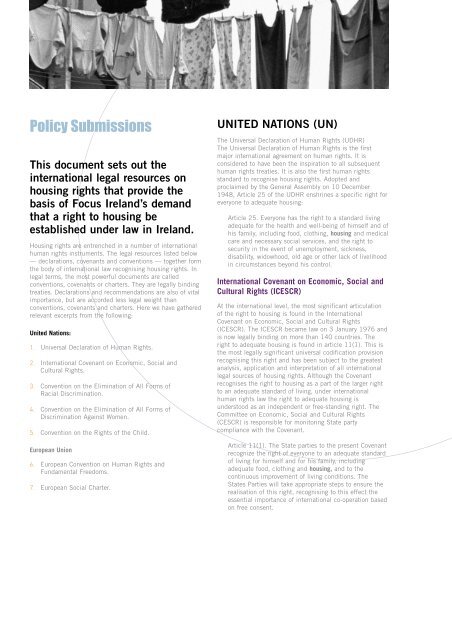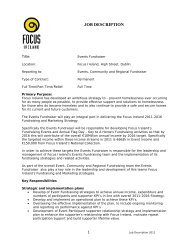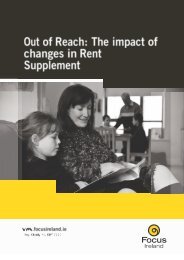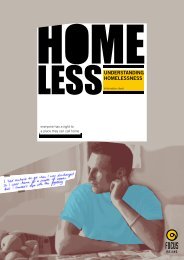Download this information leaflet here - Focus Ireland
Download this information leaflet here - Focus Ireland
Download this information leaflet here - Focus Ireland
Create successful ePaper yourself
Turn your PDF publications into a flip-book with our unique Google optimized e-Paper software.
Policy Submissions<br />
This document sets out the<br />
international legal resources on<br />
housing rights that provide the<br />
basis of <strong>Focus</strong> <strong>Ireland</strong>’s demand<br />
that a right to housing be<br />
established under law in <strong>Ireland</strong>.<br />
Housing rights are entrenched in a number of international<br />
human rights instruments. The legal resources listed below<br />
— declarations, covenants and conventions — together form<br />
the body of international law recognising housing rights. In<br />
legal terms, the most powerful documents are called<br />
conventions, covenants or charters. They are legally binding<br />
treaties. Declarations and recommendations are also of vital<br />
importance, but are accorded less legal weight than<br />
conventions, covenants and charters. Here we have gat<strong>here</strong>d<br />
relevant excerpts from the following:<br />
United Nations:<br />
1. Universal Declaration of Human Rights.<br />
2. International Covenant on Economic, Social and<br />
Cultural Rights.<br />
3. Convention on the Elimination of All Forms of<br />
Racial Discrimination.<br />
4. Convention on the Elimination of All Forms of<br />
Discrimination Against Women.<br />
5. Convention on the Rights of the Child.<br />
European Union<br />
6. European Convention on Human Rights and<br />
Fundamental Freedoms.<br />
7. European Social Charter.<br />
UNITED NATIONS (UN)<br />
The Universal Declaration of Human Rights (UDHR)<br />
The Universal Declaration of Human Rights is the first<br />
major international agreement on human rights. It is<br />
considered to have been the inspiration to all subsequent<br />
human rights treaties. It is also the first human rights<br />
standard to recognise housing rights. Adopted and<br />
proclaimed by the General Assembly on 10 December<br />
1948, Article 25 of the UDHR enshrines a specific right for<br />
everyone to adequate housing:<br />
Article 25. Everyone has the right to a standard living<br />
adequate for the health and well-being of himself and of<br />
his family, including food, clothing, housing and medical<br />
care and necessary social services, and the right to<br />
security in the event of unemployment, sickness,<br />
disability, widowhood, old age or other lack of livelihood<br />
in circumstances beyond his control.<br />
International Covenant on Economic, Social and<br />
Cultural Rights (ICESCR)<br />
At the international level, the most significant articulation<br />
of the right to housing is found in the International<br />
Covenant on Economic, Social and Cultural Rights<br />
(ICESCR). The ICESCR became law on 3 January 1976 and<br />
is now legally binding on more than 140 countries. The<br />
right to adequate housing is found in article 11(1). This is<br />
the most legally significant universal codification provision<br />
recognising <strong>this</strong> right and has been subject to the greatest<br />
analysis, application and interpretation of all international<br />
legal sources of housing rights. Although the Covenant<br />
recognises the right to housing as a part of the larger right<br />
to an adequate standard of living, under international<br />
human rights law the right to adequate housing is<br />
understood as an independent or free-standing right. The<br />
Committee on Economic, Social and Cultural Rights<br />
(CESCR) is responsible for monitoring State party<br />
compliance with the Covenant.<br />
Article 11(1). The State parties to the present Covenant<br />
recognize the right of everyone to an adequate standard<br />
of living for himself and for his family, including<br />
adequate food, clothing and housing, and to the<br />
continuous improvement of living conditions. The<br />
States Parties will take appropriate steps to ensure the<br />
realisation of <strong>this</strong> right, recognising to <strong>this</strong> effect the<br />
essential importance of international co-operation based<br />
on free consent.

















